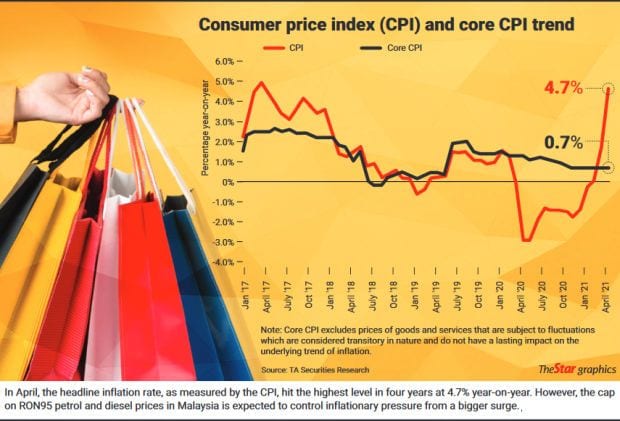PETALING JAYA: The cap on RON95 petrol and diesel prices in Malaysia is expected to control inflationary pressure from a bigger surge, considering that global crude oil prices are expected to stay high this year.
The government has committed to keep the ceiling price of RON95 at RM2.05 per litre and diesel at RM2.15 per litre, even if world oil prices head higher. The government would be covering the difference between retail fuel prices and crude oil prices through subsidies.
In February 2021, the ceiling prices of RON95 and diesel were reduced by three sen a litre as Finance Minister Tengku Datuk Seri Zafrul Abdul Aziz said it was intended to reduce people’s cost of living.
Nevertheless, experts have said that higher crude oil prices would still have a major impact on the country’s inflation this year.
According to TA Securities Research, the average fuel price in May 2021 is already 83 sen or 57.8% higher as compared to a year ago.
“We predict the inflation rate will continue to increase in May 2021 by 5.2% year-on-year (y-o-y) on expectation of greater transportation cost and low base effect, ” it said in a note yesterday.
However, the research house said this will be transitory as the headline inflation is expected to return to below 5% in June and to moderate thereafter as the base effect dissipates.
In April, the headline inflation rate, as measured by the consumer price index (CPI), hit the highest level in four years at 4.7% y-o-y.
The higher inflation was due to several factors, including the strong rebound in global oil prices and the low base effect.
TA Securities Research said CPI, excluding fuel, increased by 1.7% y-o-y in April. Meanwhile, core CPI remained muted at 0.7% y-o-y, the same rate as observed since November last year.
Core CPI excludes prices of goods and services such as fresh food that are subject to fluctuations, which are considered transitory in nature, and do not have a lasting impact on the underlying trend of inflation.
For the full-year 2021, TA Securities Research expects the headline inflation to average at 3%. Bank Negara, on the other hand, expects inflation to range between 2.5% to 4.5%.
Meanwhile, Kenanga Research projects 2021 headline inflation lower at 1.8%, despite the current inflationary environment.
The current spike in the inflation rate would ease, going into the second half of 2021, it said.
“Moving forward, rising global oil and commodity prices are expected to continue to drive inflation higher.
“However, the rapid rise in both domestic and global Covid-19 cases, coupled with the nationwide movement control order (MCO) 3.0, may exert downward pressure on prices, ” it said.
























